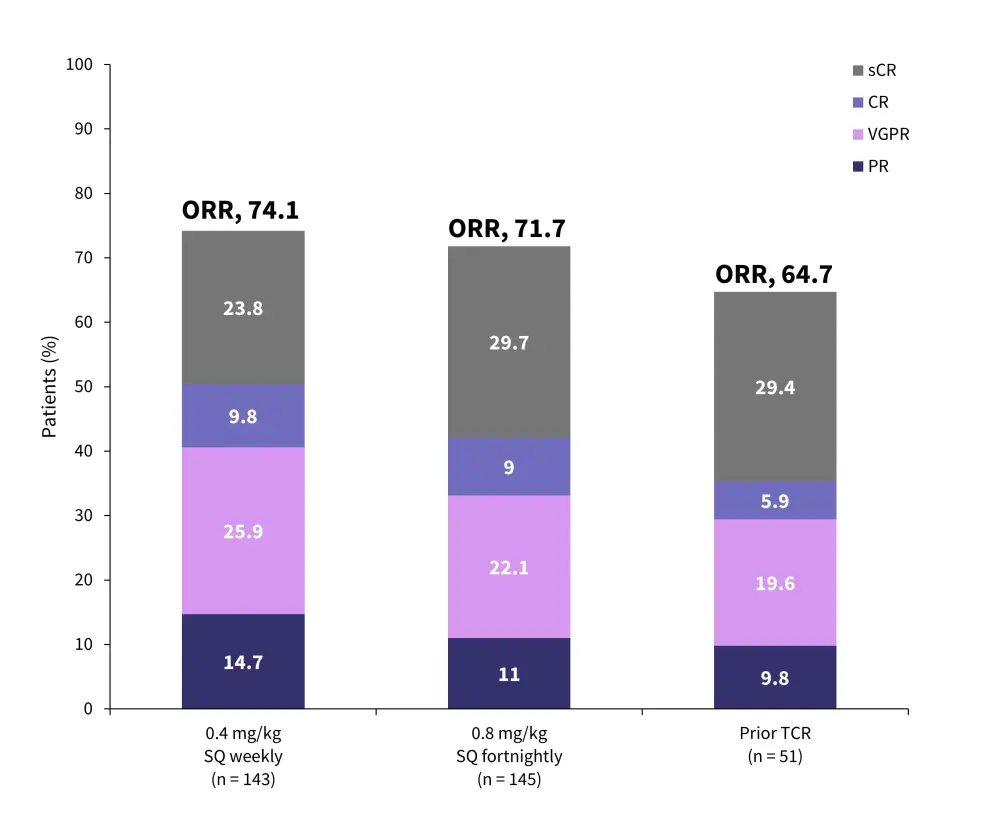All content on this site is intended for healthcare professionals only. By acknowledging this message and accessing the information on this website you are confirming that you are a Healthcare Professional. If you are a patient or carer, please visit the International Myeloma Foundation or HealthTree for Multiple Myeloma.
The mm Hub website uses a third-party service provided by Google that dynamically translates web content. Translations are machine generated, so may not be an exact or complete translation, and the mm Hub cannot guarantee the accuracy of translated content. The mm and its employees will not be liable for any direct, indirect, or consequential damages (even if foreseeable) resulting from use of the Google Translate feature. For further support with Google Translate, visit Google Translate Help.
The Multiple Myeloma Hub is an independent medical education platform, sponsored by Bristol Myers Squibb, GSK, Legend Biotech, Pfizer, and Roche. Funders are allowed no direct influence on our content. The levels of sponsorship listed are reflective of the amount of funding given. View funders.
Now you can support HCPs in making informed decisions for their patients
Your contribution helps us continuously deliver expertly curated content to HCPs worldwide. You will also have the opportunity to make a content suggestion for consideration and receive updates on the impact contributions are making to our content.
Find out more
Create an account and access these new features:
Bookmark content to read later
Select your specific areas of interest
View multiple myeloma content recommended for you
Talquetamab: latest updates from the FDA and European Commission
On August 10, 2023, the U.S. Food and Drug Administration (FDA) granted accelerated approval for the use of talquetamab in the treatment of relapsed/ refractory multiple myeloma (RRMM) for patients who have been treated with four or more prior lines of therapy. Following this, on August 22, 2023, the European Commission granted conditional marketing authorization for patients with RRMM, treated with three or more prior lines of therapy. For both the FDA and European Commission approvals, patients must have been treated with a proteasome inhibitor, an immunomodulatory agent, and an anti-CD38 antibody.1 Talquetamab is the first GPRC5D/CD3-targeted BsAb to be approved for use.
Talquetamab is an investigational bispecific T-cell engaging antibody that targets both GPRC5D and CD3. CMA has been recommended for talquetamab as a monotherapy for the treatment of patients with relapsed/refractory multiple myeloma (RRMM), who have been treated with three or more prior therapies, including an immunomodulatory agent, a proteasome inhibitor, and an anti-CD38 antibody, with observed disease progression.
MonumenTAL-1
The EMA’s CHMP recommendation for CMA is based on data from the phase I/II MonumenTAL-1 trial (NCT03145181; NCT04557098), which was presented at the 2023 European Hematology Association (EHA) Hybrid Congress. A summary of MonumenTAL-1, including its trial design has been published previously on the Multiple Myeloma Hub and can be found here.
Efficacy2
The latest response data in patients treated with 0.4 mg/kg and 0.8 mg/kg of talquetamab as well as in those with prior exposure to T-cell redirection therapy (TCR; which includes bispecific antibodies and CAR T-cell therapy) is shown in Figure 1.
Figure 1. Response rates for patients by dosing strategy and prior exposure to T-cell redirection therapy*

CR, complete response; ORR, overall response rate; PR, partial response; sCR, stringent complete response; SQ, subcutaneous; TCR, T-cell redirection; VGPR, very good partial response.
*Adapted from Touzeau.2
Safety2
Safety data for the 0.4 mg/kg weekly, 0.8 mg/kg every other week, and prior TCR dosing regimens, respectively:
- Adverse events leading to discontinuation: 4.9%, 8.3%, and 7.8%
- Cytokine-release syndrome, any grade: 79%, 74.5%, and 76.5%
- Immune effector cell-associated neurotoxicity syndrome, any grade: 10.7%, 11%, and 2.9%
- Neutropenia, Grade 3/4: 30.8%, 22.1%, 52.9%
- Infections, any grade: 58.7%, 66.2%, and 72.5%
- Infections, Grade 3/4: 19.6%, 14.5%, 27.5%
References
Please indicate your level of agreement with the following statements:
The content was clear and easy to understand
The content addressed the learning objectives
The content was relevant to my practice
I will change my clinical practice as a result of this content
Your opinion matters
On average, how many patients with MGUS/smoldering MM do you see in a month?



